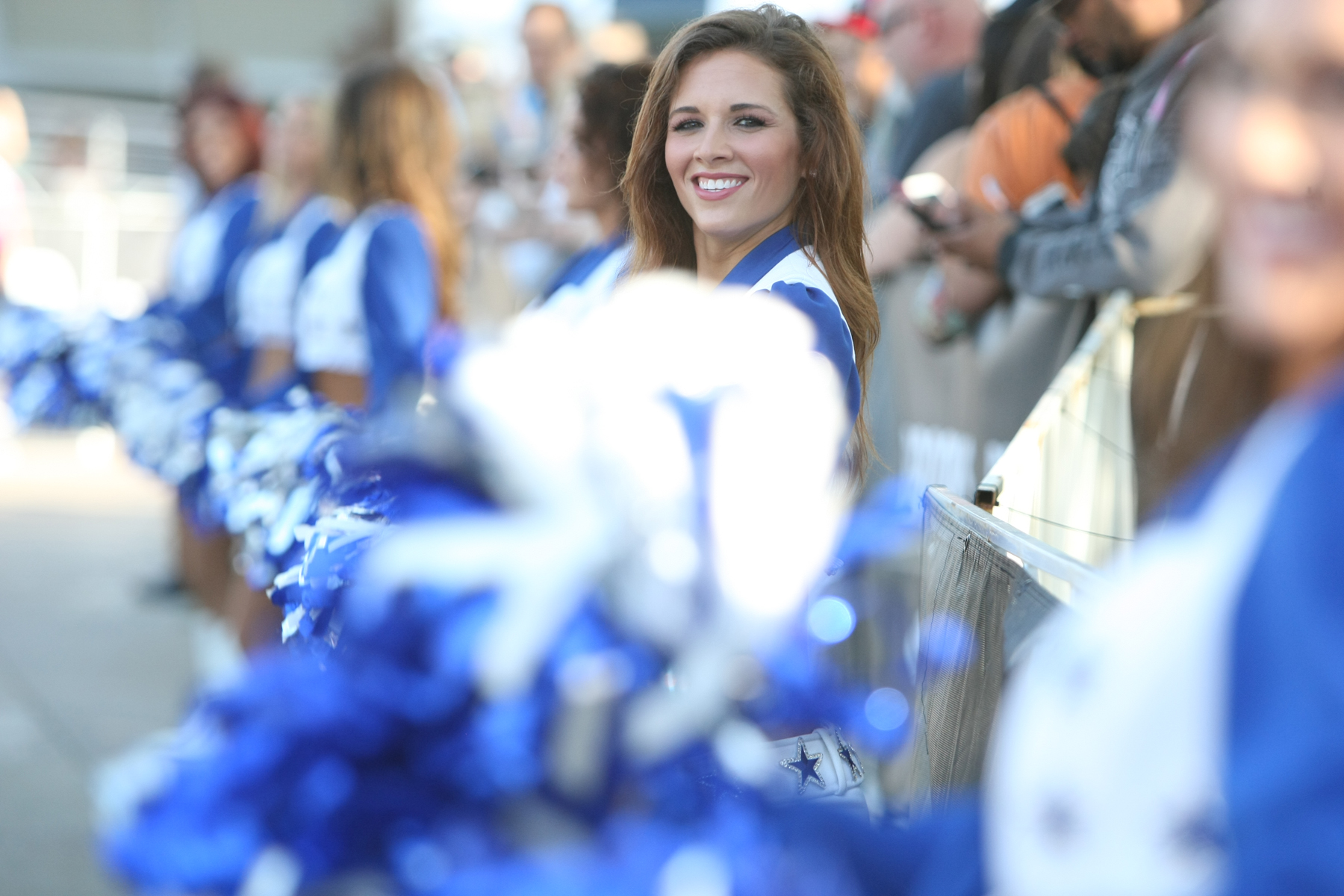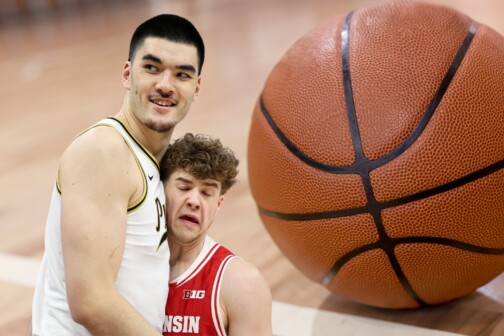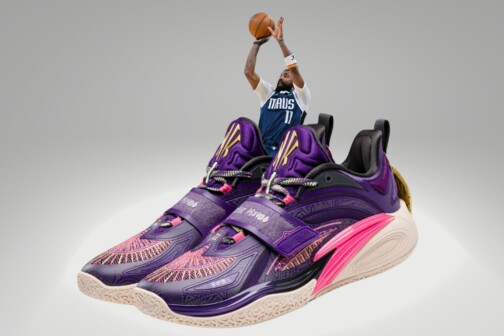During an episode of Hard Knocks, HBO’s sports docuseries co-produced with the NFL, Dallas Cowboys linebacker Micah Parsons wasn’t happy with his short playing time during a preseason game. So he argued with defensive coordinator Dan Quinn: “That was not enouuuuugh,” Parsons whined to Quinn, who brushed it aside and told Parsons to take a seat.
Nothing about the interaction would make the average viewer raise any eyebrows. A football player was frustrated because a coach wasn’t allowing him to play more. However, if you’ve watched just one second of Dallas Cowboys Cheerleaders: Making The Team, CMT’s reality show that follows women through the Dallas Cowboys Cheerleaders’ audition process, then Parsons’ behavior might stand out. That’s because the cheerleaders are never allowed to have a whiny tone and they definitely don’t talk back. Instead, it’s only “yes, ma’am” and “no, ma’am.”
The cheerleaders’ and football players’ training camp is set up differently, as well as the shows. The cheerleaders are cut almost every week until a roster of 36 is left. On Hard Knocks, the football players have the entire duration of training camp to make an impression and then coaches cut the players all at once, at the end. It’s also worth mentioning that the cheerleaders are auditioning for their spot on the team, while the football players have already been drafted. Still, the dynamics between the cheerleaders and players and their coaches are worth examining.
When Dallas Cowboys Cheerleaders director Kelli Finglass began to cut Malena, a training camp candidate who was featured on the show’s 13th season, Malena cried and had a sort of breakdown. Malena begged Finglass and Judy Trammell, DCC’s choreographer, for more time. They weren’t interested. Malena didn’t make the squad that year and when she came back to tryouts the next season, the breakdown was referenced. During panel interviews, a judge asked Malena what she thought about herself when she watched it back.
While the football player and the cheerleader responded to something they didn’t want to hear differently, both responses were passionate. The football player’s remarks were brushed aside and the cheerleader was asked to reflect on what she thought of herself.
The way players and cheerleaders speak to their respected coaches is just one of the dozens of differences viewers will catch while watching HBO’s Hard Knocks and CMT’s Dallas Cowboys Cheerleaders: Making The Team. There’s the off-field outfits. When the Dallas Cowboys have team meetings, the men wear T-shirts and athletic shorts. When the Dallas Cowboys Cheerleaders have team meetings, they wear business attire with curled hair and a full face of makeup. There’s the emphasis on education. On Dallas Cowboys Cheerleaders: Making The Team, the women boast about their college majors, like international studies, political science, and their plan to attend law school. On Hard Knocks, the only time college was brought up was when Parsons was comparing snacks.
“At Penn State, they used to have snacks at practice,” Parsons tells a teammate. “I loved that.”
Obviously, cheerleading and football aren’t one and the same. They’re two different sports with different rules and different expectations. It’s impossible to make a one-hundred percent correlation on how these athletes act and are treated, but with these two shows, audiences get a glimpse into how the Cowboys organization treats these two kinds of athletes. There are plenty of differences, which are possibly motivated by gender or just the organization’s perception of importance.
Watching Hard Knocks, it’s obvious the Cowboys players are only focused on football. It’s their full-time job and to eliminate any outside distractions, they live in an apartment complex, which they have to themselves. On Dallas Cowboys Cheerleaders: Making The Team, cheerleading is just one aspect of making the squad. The women have to be great entertainers, have a job or go to school outside of cheerleading, have “the look,” be a good speaker, and have a dynamic personality.
Having a good personality is where Nina, who competed for a spot on the Dallas Cowboys Cheerleaders and was featured on the show during season 6, fell short. Her dancing didn’t command anyone’s attention, but when Finglass and Trammell spoke to her in their office, her personality became a topic of concern. Nina spoke softly and when she left the office, Finglass turned to Trammell and said, “She is so boring.”
During the five episodes of Hard Knocks, the Cowboys coaches never critiqued a player’s personality.
During season 6 of Dallas Cowboys Cheerleaders: Making The Team, Finglass and Trammell tell Ika, a training camp candidate, that her Facebook photos concern them. The audience is never shown the photos, but Finglass says some are revealing and some have alcohol in them. During a later episode when Ika gets a makeover, Finglass notes that before the makeover, Ika doesn’t have “the girl next door look.” Instead, she has “the girl last night look.” Eventually, Ika is cut because Finglass says she is not right for the team; she’s too much of a risk to the Cowboys’ reputation.
“I don’t trust her,” Finglass says to Trammell after Ika leaves Finglass’ office. Ika’s storyline on the show mainly revolves around some sort of bad girl perception the directors have of her.
Meanwhile, on Hard Knocks, none of Ezekiel Elliott’s past mistakes seem to be a concern for anyone on the team. In 2017, TMZ published a video of the Cowboys running back pulling down a woman’s shirt, exposing her breasts during a St. Patrick’s Day parade in Dallas. He was eventually suspended for six games, partly for the incident and also for alleged domestic violence, but he was kept on the team. While watching Hard Knocks, the show gives no reference to Elliott’s past. That’s because he’s mainly portrayed as a goofy and hard working football player. There’s even one scene where he humorously tries to wrap a gift for his best friend Dak Prescott.
Football players are mainly evaluated on how well they play. Cheerleaders are evaluated on how well they dance and how good they look doing it. Modern feminism has made it clear that women can do it all, but should they have to? Becoming a Dallas Cowboys Cheerleaders is oftentimes a lifelong journey, where a woman starts dancing and training as early as 3 years old. What if a woman’s dance ability was enough? If Elliott’s misconduct is worth taking on because of his value as a football player, why can’t a cheerleader be judged for only her performance?





